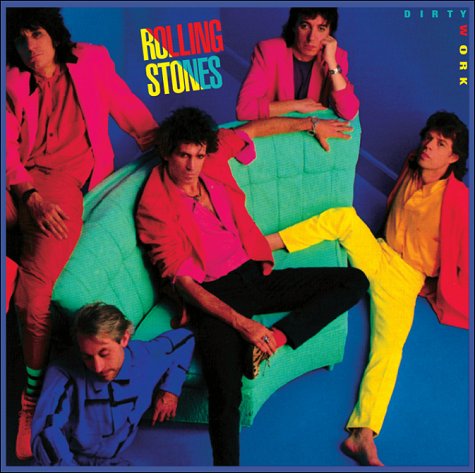
Dirty Work (1986)

1.One Hit (Too the Body)
2.Fight
3.Harlem Shuffle
4.Hold Back
5.Too Rude
6.Winning Ugly
7.Back to Zero
8.Dirty Work
9.Had it With You
10.Sleep Tonight
11.Piano Instrumental
It had to happen eventually. After years of maintaining a remarkable degree of artistic equilibrium through decades of shifting trends, the Rolling Stones finally hit the wall. Dirty Work is widely—and justifiably—regarded as the nadir of their studio output. That it turned out this way, sadly, isn’t altogether surprising. By the mid-1980s, the band was barely functioning as a cohesive unit. The long-standing creative partnership between Mick Jagger and Keith Richards had fractured to the point of open hostility, with Jagger steering hard toward slick, contemporary pop stylings that left Richards thoroughly disinterested, if not outright incensed.
This tension is all over Dirty Work. Not in the kind of combustible, inspired way that can sometimes drive a band to new heights, but rather in a tired, disengaged fashion that suggests no one really wanted to be there. Jagger was clearly preoccupied with his solo ambitions, while Richards—ever the loyalist to the band’s roots—was left to salvage what he could. In a perverse twist, it is Richards’ two vocal contributions, Too Rude and Sleep Tonight, that turn out to be the album’s most compelling moments. The former is a ghostly reggae shuffle that, while modest, works precisely because it doesn’t try too hard. The latter, a surprisingly tender ballad, is as close as the album gets to genuine pathos.
Elsewhere, it’s a different story. Harlem Shuffle, the lead single and a cover at that, is a serviceable enough slice of retro R&B, but the fact that it became the most well-known track on the record speaks volumes. When was the last time the band had to rely on a cover song to carry an album? It’s a long way from the swagger of Brown Sugar or the menace of Gimme Shelter.
The rest of the material rarely rises above perfunctory. Fight, which could have been a fiery rocker under different production circumstances, is reduced to a murky mess of gated drums and thin guitars. Back to Zero is a particular low point—an awkward attempt at topicality that sounds like it was written for a Saturday morning cartoon. Even the Stones’ typically reliable sense of humor seems to have deserted them. Tracks like Hold Back and Winning Ugly are so self-serious and overproduced that they become unintentionally comical.
Some allowances must be made. The mid-1980s were not kind to many veteran acts, and the Stones weren’t the only ones to struggle with the era’s garish sonic aesthetics. But unlike previous misfires that could at least boast a sense of risk or experimentation, Dirty Work feels like the product of obligation rather than inspiration. The album artwork—a garish collage of neon suits and forced poses—says everything you need to know.
At the time, many assumed this was the end. The band members were drifting apart, the internal wounds were deep, and the public reception was tepid at best. But as history would prove, the Stones weren’t quite finished. Their resurrection would come, but not just yet. Dirty Work remains the one album that even the most devout fans approach with caution. It is, unmistakably, the sound of a band that had momentarily lost its way.
Go back to the main page
Go To Next Review